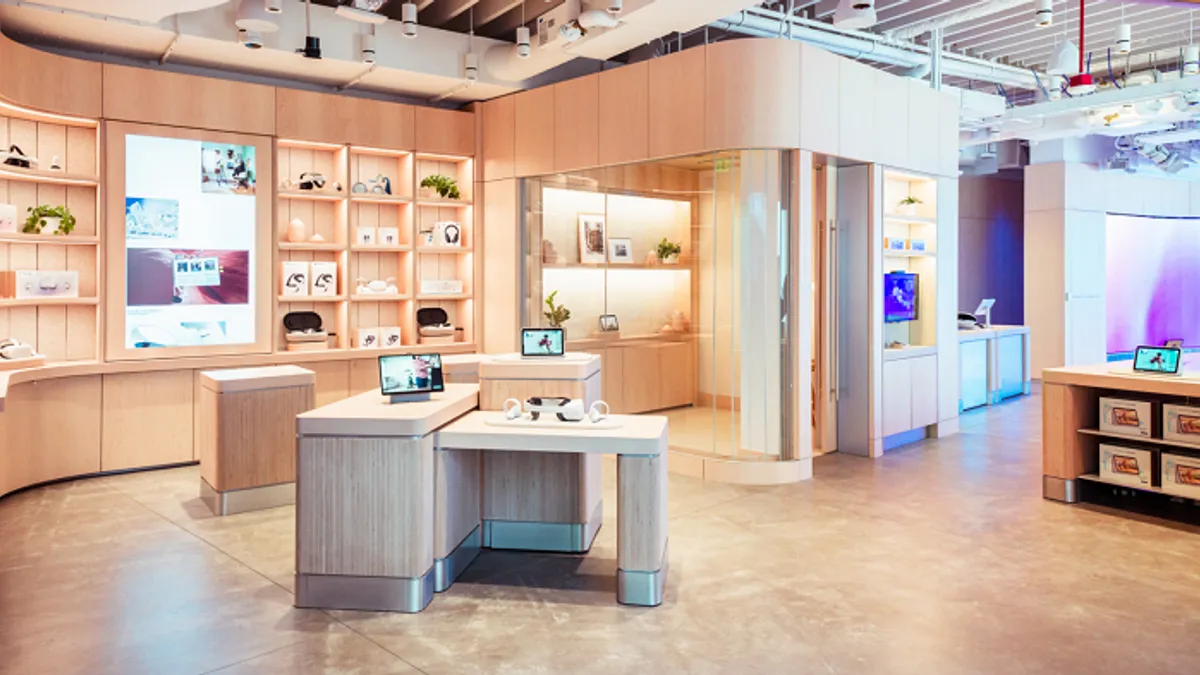Dive Brief:
- Meta is continuing to stake its claim in the yet-to-be-defined metaverse. The company will debut its first Meta Store, which will allow customers to test Portal, Ray-Ban Stories and Quest 2, in Burlingame, California, on May 9, according to a Monday blog post.
- At the 1,550-square foot store, customers are encouraged to be hands-on with VR headsets, smart glasses and video chat products. The company is also launching a new shop tab on its website where items can be purchased.
- Meta, formerly known as Facebook, chose to open its storefront near its Reality Labs headquarters, where it’s developing technology for the metaverse concept.
Dive Insight:
The abstraction of the metaverse remains amorphous, but Meta hopes to promote technologies and demonstrate the metaverse’s potential with its store.
“The Meta Store is going to help people make that connection to how our products can be the gateway to the metaverse in the future,” Martin Gilliard, head of Meta Store, said in a statement. “We’re not selling the metaverse in our store, but hopefully, people will come in and walk out knowing a little bit more about how our products will help connect them to it.”
Shoppers can try out Beat Saber, GOLF+, Real VR Fishing or Supernatural in its Quest 2 area, where others can observe what testers are seeing in their VR device on a large LED screen. Customers can also make video calls to retail associates with Portal, and can try on and demo Ray-Ban Stories, the company's first-generation smart glasses.
The store opening is a continuation of Meta’s metaverse ambitions. In mid-April, the company piloted tools to let creators sell digital goods and experiences via Horizon Worlds, its metaverse platform, in exchange for a 30% fee for digital goods sold.
So far, Gen Z’s engagement with the metaverse seems to be mixed. A report from Vice Media Group and Publicis Groupe’s Razorfish found that Gen Z spends twice as much time socially interacting in the metaverse than they do in real life. Plus, 52% of Gen Z gamers want to make money in the metaverse, and one-third aspire to build their careers in the space. However, a recent Piper Sandler report found that more than a quarter of teenagers have a VR device, but only 5% use it daily, and less than half said they are unsure of or aren’t interested in the metaverse.
As companies like Meta develop the underlying technology for the metaverse, experts advise that brands must proceed with caution. Though Gartner earlier this year predicted that a quarter of people will spend at least one hour per day shopping, working, socializing and attending school in the metaverse by 2026, the firm cautioned companies against placing too many resources into one component of the metaverse, because it has yet to be fully formed. Experts have also warned about brands potentially appearing alongside objectionable content in the metaverse.
Meta is unveiling its store at a time when retailers’ physical storefronts seem to be recovering. By the end of January, store closures had dropped 65% compared to last year, according to Coresight Research. Meanwhile, many direct-to-consumer brands have found that opening physical retail space has helped further its expansion and marketing ambitions.















